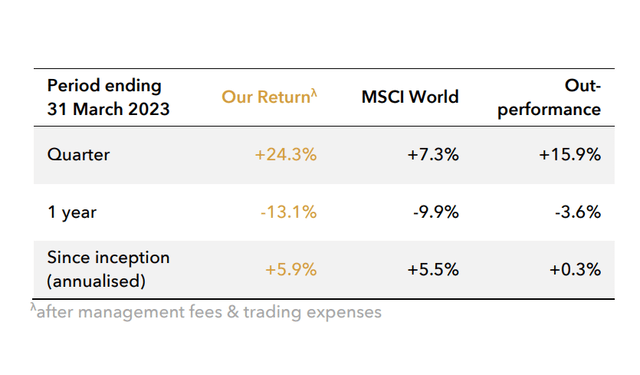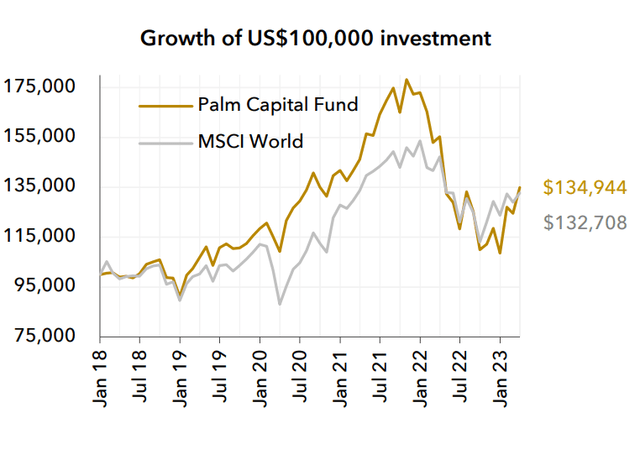At Palm Capital, we look for businesses with durable competitive advantages run by exceptional managers. We patiently wait to invest when their prices are less than we think they are worth, aiming to benefit as they compound economic value over time. We only sell if fundamentals deteriorate, or we find others offering potentially better after-tax returns.
Our performance
Over the three months ending 31 March 2023, our portfolio increased by 24.3% after management fees & trading expenses.
Since we started, just over five years ago, our portfolio has returned 5.9% per annum after management fees & expenses. We have outperformed the MSCI World Index by 0.3% per annum.


Is Google Search under threat from ChatGPT and Generative AI?
Last year, Generative AI came into its own with the launch of DALL-E, Midjourney, Stable Diffusion and then finally ChatGPT. ChatGPT caused the most hype – probably because it was the first time a layperson could use AI and see the results firsthand. It racked up one million users within five days of launch.
One of the early narratives around ChatGPT was how it would disrupt Google Search because it gave users direct answers that they didn’t have to dig for themselves. And if Google pivoted to this model and users didn’t have to click on links, there would be no way for them to monetise by selling ads. The narrative caught on when Microsoft announced its plans to integrate ChatGPT into its search engine, Bing.
We don’t think it’s easy to unseat Google (GOOG) (GOOGL). We’ll explain why below.
1. There are three types of search queries on Google:
- navigational – finding a particular website,
- informational – learning about something, and
- transactional – intending to buy something.
- Almost all the ads on Google are from transactional search. In fact, Google does not show ads, i.e. make money, on 80% of all searches. And in its current form, ChatGPT is unlikely to disrupt transactional search.
2. Google also has a significant distribution advantage. With 90% market share in search, it has become the eponym for it. It is the default search engine in nearly every browser and on every phone. In 2011, Bill Gurley expanded on its moat best:
“Android, as well as Chrome… are not ‘products’ in the classic business sense. They have no plan to become their own ‘economic castles’. Rather they are very expensive and very aggressive ‘moats’, funded by the height and magnitude of Google’s castle. Google’s aim is defensive not offensive. They are not trying to make a profit on Android or Chrome. They want to take any layer that lives between themselves and the consumer and make it free. Because these layers are basically software products with no variable costs, this is a very viable defensive strategy. In essence, they are not just building a moat; Google is also scorching the earth for 250 miles around the outside of the castle to ensure no one can approach it..”
And to top it off, most websites optimise for Google Search. It would be a big task to optimise for another search engine such as Bing.
3. Google has used Machine Learning and AI to improve its search engine for many years and has led in the space. It is even the inventor of the transformer (the ‘T’ in ‘GPT’) which is the key technology underlying Generative AI. It recently launched its own conversation chat program, Bard, and is integrating this into its search engine. And it has several products in which it can launch its AI capabilities; the company has 15 products with more than 500 million users, six of which have more than two billion users. It has showcased exciting generative AI features for its Workplace apps, including ways to generate articles in Docs based on a user’s bullet points, and the ability to produce images and video to illustrate presentations in Slides.
4. Generative AI is probabilistic and not deterministic. A deterministic model, like a calculator for example, provides exact outputs for given inputs. It can distinguish between right and wrong. A probabilistic Large Language Model like ChatGPT, on the other hand, is a statistical model that works out what pieces of language likely go together in different contexts. This explains why ChatGPT can return wrong answers that are very convincing. Until there’s a way to verify its answers, it’s unlikely to become the de facto destination for search.
Clayton Christensen, in his book ‘The Innovator’s Dilemma’ differentiated between two types of technologies – disruptive and sustaining:
“Sustaining technologies… improve the performance of established products, (in a way that) mainstream customers… have historically valued…. Disruptive technologies have (new) features that a few fringe customer value.”
Generative AI is evolving rapidly and it’s early days, but the points above seem to indicate that AI is more of a sustaining technology that will improve Google’s products rather than a disruptive one that will replace them. And there are two more points that we think confirm this:
- Unlike the internet – which reduced the marginal cost of distributing information to zero, AI does not reduce the marginal cost of generating information to zero. Each query requires computation – or GPU power (which is why the leading GPU producer, Nvidia (NVDA), seems to be the obvious winner from AI). So, only the biggest companies with the resources to fund this and experience of rolling out and offering online products at scale will be able to do so for AI.
- Unsure of the implications of AI, governments appear to be taking strong stances on it. Europe and Canada, who have introduced heavy-handed legislation around it are cases in point. And regulation favours the incumbents as it increases the costs for an upstart.
Both factors work in Google’s favour. This explains why (aside from it being undervalued) we were and remain very comfortable with our position in Alphabet.

Original Post
Editor’s Note: The summary bullets for this article were chosen by Seeking Alpha editors.
Read the full article here


